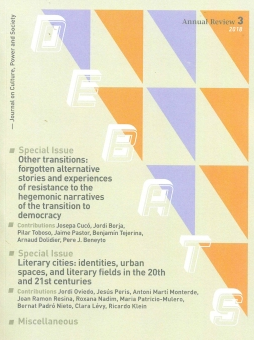Between history, myth, and the present: an asymmetric transaction
Abstract
The period known as the Spanish political transition—whose duration is still subject to debate—has been interpreted in many ways, though the dominant and official narrative is the version that portrays it as ‘exemplary’. This paper critically reviews the process that led to the relative stabilisation of a new parliamentary monarchy together with its gradual integration into the European project. We highlight the context, uncertainties, and splitting crossroads that appeared in different periods of the transition. This paper upholds the idea that the transition was an asymmetric compromise that avoided a democratic rupture with Franco’s dictatorship and its legacy. We recognise the liberties and rights that were won, but likewise, we emphasise the costs entailed in this process. In particular, the transition had a high political cost in that it fostered an elitist political culture that, in spite of several waves of protests, was not challenged by a social majority until the emergence of the most recent surge of protest as an result of the 15 May 2011 movement. Since then, the unfolding crisis of the regime—which is related to the crisis also currently affecting the EU in the aftermath of the financial and real estate crisis of 2008—as well as the internal national–territorial division in Spain, has once again put the issue of the Spanish transition, and the possible need for a ‘second transition’ or new constituent processes, under the spotlight of debate.Downloads
Downloads
Published
How to Cite
Issue
Section
License
Without prejudice to the provisions of article 52 of Spanish Law 22/1987 of November 11 on Intellectual Property, BOE (official state bulletin) of November 17, 1987, and pursuant to said legislation, the author(s) surrender(s) free of charge its rights of edition, publication, distribution and sale of the article, for its publication in Debats. Journal on Culture, Power and Society.
Debats. Journal on Culture, Power and Society is published under the Creative Commons license system in accordance with the «Recognition - Non-Commercial (by-nc) modality: The generation of derivative works is permitted provided that commercial use is not made. Nor can the original work be used for commercial purposes».
Thus, when the author submits his/her contribution, he/she explicitly accepts this assignment of publishing and publishing rights. Authors also authorize Debats. Journal on Culture, Power and Society to include their work in an issue of the journal to be distributed and sold.











